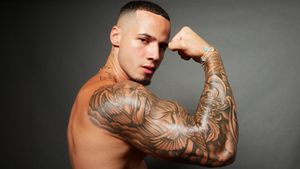After serving 19 months of a 41-month sentence, CeCe McDonald, the woman who became the poster child for victims of anti-transgender discrimination within the justice system, is now using the spotlight to tell her story.
"I never expected that people would look up to me," she tells The Advocate in a humble tone. "In prison, I got lots of letters of support. It showed that people cared. I never thought that people were actually seeing me as this leader or a role model. It's really amazing that it got to this level, and I'm glad that I have this platform so I can get the word out about the prison-industrial complex, trans women, African-American trans women, people of color."
McDonald's story is one of survival -- of a woman betrayed by a system that should have protected her, but instead, prosecuted her. In June 2011, McDonald and four of her friends were verbally and physically assaulted by Dean Schmitz, Jenny Thoreson, and Molly Flaherty. According to Larry Tyaries Thomas, one of McDonald's friends, Schmitz, Thoreson, and Flaherty began calling members of McDonald's group "f****ts" and "n----- babies," and calling McDonald "tranny."
Flaherty escalated the verbal confrontation to a physical one when she smashed a glass on McDonald's face, slicing her skin and creating a gash that would eventually need to be sewn shut with 11 stitches. Flaherty later pleaded guilty to third-degree assault and was sentenced to 180 days in jail.
Schmitz then pushed McDonald to the ground. As Schmitz approached her with his hands balled into fists, McDonald grabbed a pair of scissors she had been carrying. McDonald stabbed Schmitz with the scissors, inflicting a mortal wound. The 47-year-old Schmitz died at the scene.
McDonald was charged with second-degree murder in Schmitz's death, though McDonald's lawyer argued that what had transpired was an act of self-defense. With the possibility of a 25-year prison sentence looming, McDonald accepted a deal, pleading guilty to second-degree manslaughter, which resulted in a 41-month sentence. Despite initial hopes that she'd be placed with other women, it was determined that McDonald would serve her time in a men's correctional facility, where she stayed until her release in January.
Finally out, McDonald has spent her time speaking out against the prison-industrial complex. In a January 19 interview with MSNBC's Melissa Harris-Perry, McDonald spoke about the type of psychological punishment that had been inflicted on her during her prison stay.
"I felt like they wanted me to hate myself as a trans woman," she said, adding, "Prisons aren't safe for anyone, and that's the key issue."
More recently, McDonald told The Advocate about the often uncertain nature of trans placement in prison. Frequently, as in McDonald's case, trans women are placed in men's prisons, where they find themselves at significantly higher risk of becoming the victim of sexual assault or abuse when compared to other inmates. Some have argued that trans women should be placed in solitary confinement as a means to reduce their exposure to physical harm, though this has the unwanted effect of inflicting emotional and mental stress on the individual.
"A lot of time people don't know the circumstances that come along with trans women in prison," McDonald says.
When asked if Laverne Cox's character on Orange Is the New Black might inadvertently lead people to falsely believe trans women are traditionally housed with other women, she downplays the question, focusing on the specifics of Cox's character.
"Because Laverne plays a woman who has had gender-reassignment surgery, she was allowed to be in a women's prison because, in most states, that's how it is," she says. "A lot of times, when a woman has had gender-reassignment surgery, she's allowed to be in a women's prison, and a lot of times, she's not."
This raises the question of whether inconsistencies in placement contribute to the typically cruel treatment of trans women, given that there don't appear to be standardized procedures for incarceration, an ongoing concern among trans activists.
McDonald has been working with Cox on a documentary titled Free CeCe. It's her hope that the film will help give a face and a voice to trans inmates, humanizing them: "In the documentary you'll see me as a person, with my family and friends; seeing the personality and the humor, and the life that I have and share with others."
That first qualifier -- "person" -- speaks to the tragic state of public understanding of trans people. Many trans individuals have frequently said they tend to be teated as a type of aberration or atrocity, as opposed to recognizing their humanity.
The man who attacked McDonald had a symbol of hated, a swastika, tattooed on his chest, also symbolic of what happens when the world fears those who are different. In a fair world-- one without institutionalized racism, sexism, and bigotry -- maybe he wouldn't have felt the need to harass a complete stranger, and his friend wouldn't find it appropriate to physically assault that woman. In a fair world, McDonald wouldn't have sensed a need to protect herself from imminent harm the way she did.
Sadly, this isn't a fair world. McDonald went to prison and Schmitz died. But McDonald hopes her story and others can help change that.
"I feel like, at first, I wasn't ready for this type of leadership, this type of position," McDonald says of her status as a role model. "But there's no one out there who's really saying it. There are people like Laverne Cox and Janet Mock, and people in the trans community who work hard to raise awareness of trans issues, but there aren't enough of us that are spreading the word about injustices, discrimination, and dehumanization of the LGBTQI community."
McDonald says it's most important to forge unity between all people -- cis and trans, straight and gay -- to come together in an effort to fight deeply ingrained negative societal assumptions.
"If I need to take this position, to use this platform to get this word out, then I will," she says. "I want to see some type of change with the cis and trans communities. We need to be more collective, have an initiative to change the hate, discrimination, and injustices for the LGBTQI community."
What the world does have, however, is hope. Because McDonald had to endure this event and because she had to experience firsthand how society's biases can be used against her, she has become uniquely qualified to lead a conversation moving forward, taking on the considerable task of chipping away at the world's evils.
Free CeCe is being produced by Laverne Cox and Jacqueline Gares. More information about the documentary is at FreeCeCeDocumentary.net.













































































